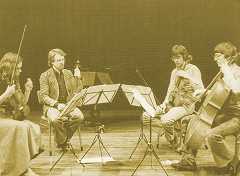Air of another planet
A quarter century of musical conviction
The Schoenberg Quartet celebrates a milestone
Niek Nelissen
A breakthrough: the 1981 Schoenberg series
 Without any disparagement intended towards the Schoenberg Ensemble’s accomplishments, it would not be untrue to say that the climate of the seventies was a favourable one. It was a time of increasing interest in small and polymorphous ensembles, when audiences were open-minded to a broader repertoire and twentieth-century music, the latter having long been neglected. As recently as 1967 the respected newspaper De Volkskrant, reviewing a performance by the Concertgebouw Orchestra of Schoenberg’s Variations op. 31 under Pierre Boulez, had dismissed the work as ‘old Krautish claptrap’ by a ‘reactionary’. Ten years later such a reaction was practically unthinkable. The extent to which interest in the Second Viennese School was growing was reflected by the stream of major recordings in the field made during the seventies. CBS and Deutsche Grammophon brought out prestigious recordings of the Juilliard and LaSalle Quartets. Just as significant are the five long-playing records of Schoenberg’s works for ensemble played by the London Sinfonietta, issued by Decca in 1974. This was exactly the repertoire that Henk Guittart had in mind for the Schoenberg Ensemble as the seventies were drawing to a close.
Without any disparagement intended towards the Schoenberg Ensemble’s accomplishments, it would not be untrue to say that the climate of the seventies was a favourable one. It was a time of increasing interest in small and polymorphous ensembles, when audiences were open-minded to a broader repertoire and twentieth-century music, the latter having long been neglected. As recently as 1967 the respected newspaper De Volkskrant, reviewing a performance by the Concertgebouw Orchestra of Schoenberg’s Variations op. 31 under Pierre Boulez, had dismissed the work as ‘old Krautish claptrap’ by a ‘reactionary’. Ten years later such a reaction was practically unthinkable. The extent to which interest in the Second Viennese School was growing was reflected by the stream of major recordings in the field made during the seventies. CBS and Deutsche Grammophon brought out prestigious recordings of the Juilliard and LaSalle Quartets. Just as significant are the five long-playing records of Schoenberg’s works for ensemble played by the London Sinfonietta, issued by Decca in 1974. This was exactly the repertoire that Henk Guittart had in mind for the Schoenberg Ensemble as the seventies were drawing to a close.
By 1981, the year of the thirtieth anniversary of Schoenberg’s death, the time seemed ripe for an ambitious project, namely the composer’s entire chamber music oeuvre. This undertaking resulted in the Schoenberg Ensemble becoming more institutionalised. As it happened, the Schoenberg Ensemble Foundation was set up in 1980 with a view to making the venture possible. This new body applied for and was granted a subsidy by the city of The Hague. Henk Guittart recalls that some of the ensemble’s members found the project too ambitious. “A number of colleagues pulled me down a rung or two, saying that the task of playing all Schoenberg’s quartets within a year was far too much to ask. Obviously they were quite right, so we asked the Amsterdam String Quartet to participate. They played the second, third and fourth quartets, while we did quartets numbers zero and one, the String Trio, and Verklärte Nacht. Schoenberg’s Wind Quintet was played by he Fodor Quintet.” Reactions to the chamber music series were extremely enthusiastic. After a performance of Verklärte Nacht in Het Binnenhof, the Dutch parliament building, on 14 January 1981, John Kasander wrote that the six string players were ‘marvellously unified’, and that they projected the music ‘with the right cohesion and intensity’. Reviewing the same concert for Het Vaderland, Peter Visser remarked that although ‘the intonation was not perfect’, he extolled the vigour and expressivity of the performance. Later that year the same critic dubbed the performance of Schoenberg’s First String Quartet ‘an act of courage’.
The Schoenberg series was a turning point because the strings of the Schoenberg Ensemble started presenting themselves as a string quartet, adding substantial quartets to their repertoire. A good example of this was the massive First String Quartet of Arthur Schnabel, which they learnt in 1982. One particular performance of this work was broadcast several times by Radio Netherlands Wereldomroep. Walter Levin, leader of the LaSalle Quartet, on hearing a radio broadcast in the United States of this fascinating work, one which he would have liked to record with his own quartet, drew the conclusion – quite wrongly – that the work had already been committed to vinyl. This was the reason, as Levin later told the Schoenberg Quartet, why the LaSalle Quartet opted for Schnabel’s Third String Quartet for a Deutsche Grammophon recording. During the same year the strings of the Schoenberg Ensemble took part in a world première. In a concert for the Hindemith Stiftung in Frankfurt, Guittart’s Melancholie op. 13 found itself in the company of unpublished compositions by Hindemith. The quartet’s performance with Marjanne Kweksilber of these four songs for soprano and string quartet was one of the highlights of the 1982 Holland Festival.